Her dress is very plain,
Her apron's long, her sleeves are short,
Her name is Mary Jane.
Project Gutenberg's The Nursery, December 1881, Vol. XXX, by Various
This eBook is for the use of anyone anywhere at no cost and with
almost no restrictions whatsoever. You may copy it, give it away or
re-use it under the terms of the Project Gutenberg License included
with this eBook or online at www.gutenberg.org
Title: The Nursery, December 1881, Vol. XXX
A Monthly Magazine for Youngest Readers
Author: Various
Release Date: February 22, 2013 [EBook #42161]
Language: English
Character set encoding: UTF-8
*** START OF THIS PROJECT GUTENBERG EBOOK THE NURSERY, DECEMBER 1881 ***
Produced by Emmy, Juliet Sutherland and the Online
Distributed Proofreading Team at http://www.pgdp.net Music
transcribed by Veronika Redfern.
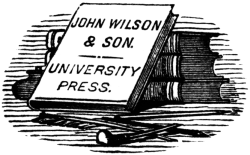
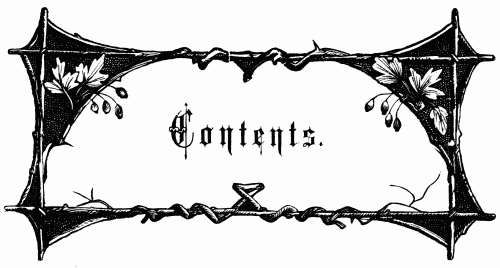
IN PROSE. |
|
| PAGE | |
| [iv]The Bird-Store | 353 |
| What Astonished Charley | 357 |
| The Christmas Carol | 358 |
| How the Sheep were Saved | 360 |
| The Two Rats | 362 |
| The Roman Pigeon | 366 |
| Ready for a Walk | 370 |
| Lily and her Kitten | 371 |
| Thirsty Billy | 373 |
| About Windmills | 375 |
| Annie's Gift | 376 |
| Flossie's Pet Alligator | 378 |
IN VERSE. |
|
| Christmas | 355 |
| That Girl | 356 |
| A Funny Little Boy | 365 |
| A Defiance | 374 |
| "The Nursery" to its Readers | 379 |
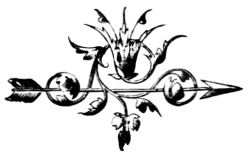
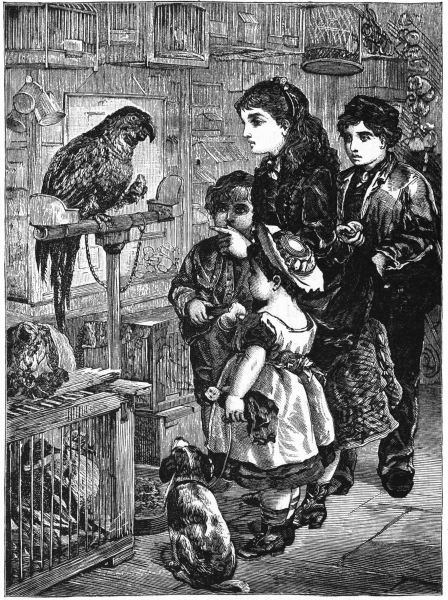 THE BIRD-STORE.
THE BIRD-STORE.
She had often been there to play with the pretty creatures, and many of them had come to know her well. One large gray parrot had learned her name, and would call out, "Good-morning, Susan!" as soon as she appeared. And when she put out her hand, and said, "Shake hands," he would give his claw, and go through the ceremony very well, often saying, "Glad to see you! How do you do?"
One day Susan had two little friends visit her,—Willy and Bessie Hill; and, as they had never seen a parrot, she proposed to take them to the bird-store. They were both delighted to go; and Bessie took her doll and her dog Snip with her.
In her right hand she carried a cake; and the first thing the parrot said as she went towards him was, "Polly wants a cake."
This made the little girl laugh. She laughed still more when the parrot took a piece of cake in his claw, and ate it, bit by bit, as nicely as she could herself.
But when Snip barked at the parrot, and the parrot barked too, she thought it was the funniest thing yet, and laughed till the tears came.
The parrot was so well pleased with his visitors, and talked so fast, that a boy with oranges to sell, came behind to listen. He was much astonished; for he too had never heard a bird speak before.
The children looked a little at the other birds and pets; but none interested them as much as the parrot.[355]
Bessie did not want to leave him, and wished she might have him for her own. But when Mr. Smith, his owner, asked if she would like to give him her dog, and take the parrot, she shook her head, and said, "No, no!"
She could not think of parting with her old friend Snip, even for the funny parrot.

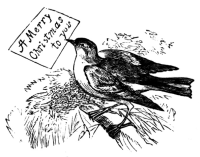
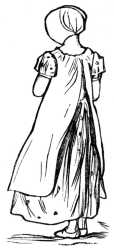
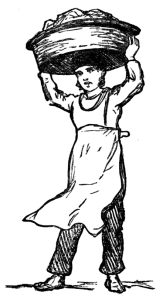
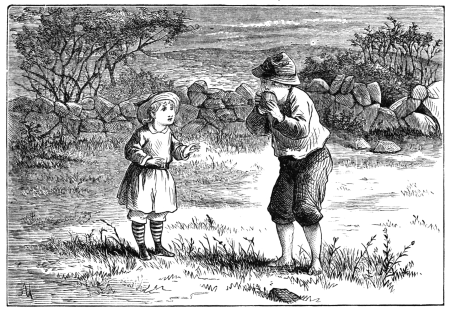

With the apple in his hand, Charley was trudging along through the fields, when he met Peter, the son of a farmer who lived near by.
Now Peter was a bad boy, with whom Charley had been told to have nothing to do. But, as Peter greeted him very kindly, how could poor Charley help speaking to him?
Pretty soon Peter began to ask questions. "What kind of an apple is that?" said he.
"I don't know," said Charley.
"Let me look at it," said Peter.
Charley did not want him to take it, but hadn't quite[358] courage enough to say "No;" and in a moment Peter had the apple in his hand. "I wonder whether it is sweet, or sour," said he.
The picture shows what happened next. Peter munched the apple, while the little boy looked on amazed, not knowing what to do or say.
"It's for my mother," gasped out Charley as soon as he could speak.
"Why didn't you tell me that before?" said the saucy Peter, handing him back the core. "Here, take the sour thing: I don't want it."
Poor Charley had to go home and tell this pitiful story. But he learned a lesson from it that he never forgot.

They are singing joyous carols; and their faces look so sweet and happy, that I am sure they must be singing with their hearts as well as their voices.
Even the youngest, though she cannot yet read or sing, sits cuddled against her sister, her small hands folded on her lap, quietly listening. The pleased look on her face tells us that she loves to hear the others sing.
I think she will remember some of the sweet words, and will very likely try to sing them when she is at home.
Behind the group of children may be seen a table monument. There are many of these in old English churches. The figure on the top, carved in stone, probably resembles[359] some knight or warrior, in memory of whom the monument was placed here long, long ago.
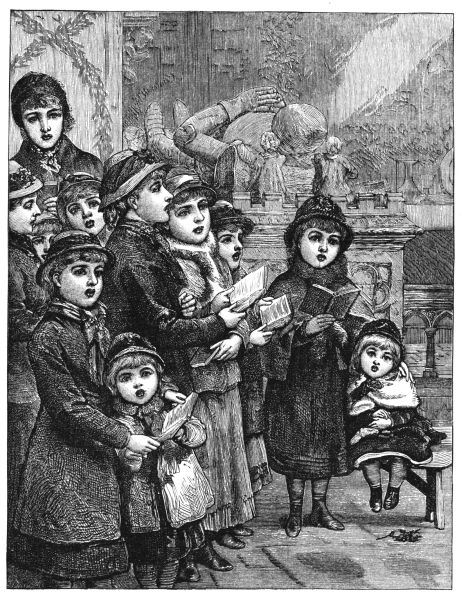
After the service, we can fancy the children having a merry time,—such as we hope every child in our own land, as well as in Old England, may have, this very next Christmas, which is so near at hand.

Such a storm, indeed, had not been known for a long, long time. The wind was blowing hard, and the snow was still falling steadily.
Now, the farmer had a great many sheep, and had not yet housed them for the winter. They were out on the hills in the open air, without any shelter.
"My poor sheep!" exclaimed the farmer. "They will be buried in the snow. They will perish with the cold."
He dressed as quickly as possible, called all his men, and his good dog Watch, and started out. It was slow work getting through the snow-drifts. Poor Watch was almost buried sometimes. But the men helped him out, and on he ran again, leaping after them like the good faithful dog he was. At last they came to the place where the sheep had been left. Not one could be seen; but in a corner of the field there was a huge pile of snow, about which Watch began to scratch and howl.
By this they knew that the sheep were all huddled under the snow. The men set to work with their shovels; but for some time no sound came from the sheep. It was so cold that some of the men got discouraged, and wanted to give up the search, and go home.
"Go, if you choose," said the farmer; "but I shall stay and dig till I find my sheep."
This made the men feel ashamed, and they picked up their shovels and went to work again.
"Wait a bit," said the farmer: "let me listen."
He put his ear close to the wall of snow, and heard a faint "Ba-a-ah" through it. Then they knew that one sheep at least was alive. So they dug away briskly and in a few minutes they pulled it out.
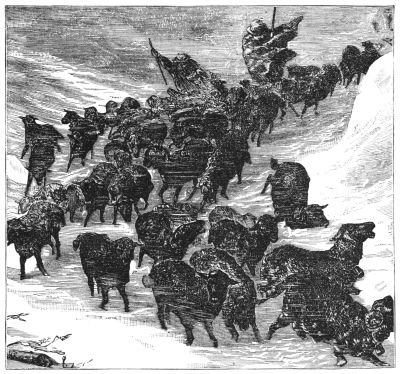
Watch took charge of it at once, pressing his warm body against the frosty fleece, and licking its face and feet to warm them.
So, one after another, the sheep were drawn out of their snow-cave, and then the men drove them home. Some of the small and feeble ones they had to carry in their arms, wrapping their cloaks about the little creatures to protect them from the sharp wind.[362]
The snow beat in the faces of the men so that it almost blinded them; and it was very difficult, both for themselves and the poor weak sheep, to make their way through the great drifts.
They were glad enough, you may be sure, when they got safely back to the farm. There the sheep were soon put in a comfortable shed, and fed with warm milk to restore their strength. The poor animals would certainly have died, but for the kind care that was taken of them.
The farmer thanked his men for staying to help him. His wife gave them a good hot breakfast; and I think they enjoyed it all the more for having saved the poor, helpless sheep from perishing under the snow.

The wise old rat we will call Crafty. His home was in Farmer Rural's cellar: that is to say, the front-door of it opened into the cellar; but there was a back-door in the garden, and there were passage-ways under ground, leading to the corn-barn and the drain.
Crafty had studied the ways of the human race for many years. In his view man was created for the benefit of rats. He had known men who were almost as sly as rats; but on the whole he looked upon them as inferior beings.
Simple, who lived close by, had also a great contempt for men and women. He often boasted that he got his board[363] and lodging all at their expense. But he did not know half as much as he thought he did; and many a time he had been kept from getting into a scrape by his good friend Crafty.
One night, about twelve o'clock, Crafty and Simple started out together to see what they could find. Having poked into every corner of Farmer Rural's cellar, without getting any thing better than raw potatoes, they made their way up stairs.
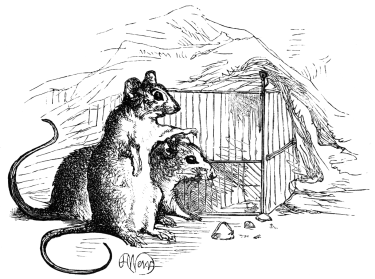
Just at the head of the stairs they came upon a sort of wire safe in which there was a most tempting bit of cheese. The door of the safe was open.
"Here's a feast," said Simple; and he was about to dart into the safe.
"Stop, my young friend," said Crafty, sitting bolt upright on his haunches. "That cheese has been put there on purpose for us."
"Well, then, why shouldn't we take it?" said Simple.
"Take my advice," said Crafty, "and let the cheese alone.[364] Many a fine young rat has been cut off in the flower of his youth by snatching at the first good thing that happened to be put in his way. That safe is what men call a trap, and it is a very unsafe thing for you to meddle with."
A few nights after, the two friends started out once more, and in the middle of the cellar they found a nice barrel of meal. Simple was on the point of jumping right into it; but old Crafty stopped him again.
"Don't you know better than that, you greenhorn?" said he. "Never jump into a barrel in that way. Look here." And, crawling on the rim of the barrel, he flapped his long tail into the meal. "Splash, splash!" Right under the meal there was water.
"Ho, ho, Farmer Rural!" said Crafty, "that's your game, is it? You can keep this meal for your own eating."
But the next time that the two rats went out together, poor Simple did not come off so well. In spite of his friend's advice, he went after some bread-crumbs that were scattered on the top of what seemed to be a harmless wooden box.
It was a trap, of course. Simple was caught, and Crafty had to go back to his hole alone.
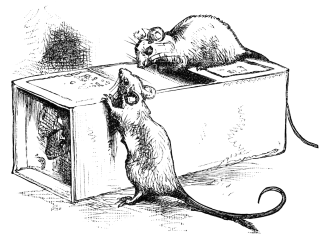
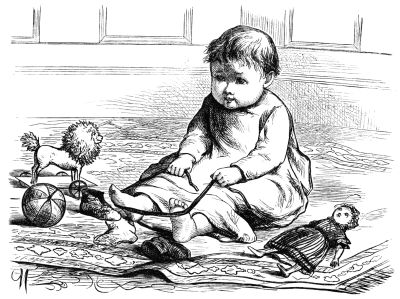

We were obliged to go through this entry often, as it was the only passage-way between our rooms. It was so narrow that one could touch both side-walls at the same time. I had often, in going through it, felt that I was not alone: the movement of something always startled me.
It was not like the motions of a human being, and I was too old to have visits from fairies. A dog would bark; a kitten would mew; a parrot would say "Pardon!" Then what was it? I could not tell.
One night, after spending the day in the Catacombs, which are nothing more than cities of the dead, under ground, and after tumbling over my companions, and treading on the heels of the guide, I came home hoping for a quiet, peaceful evening. Finding, however, an invitation to spend that evening with a lady who lived at the other end of the palace, I felt bound to accept it.
As I passed along the dark, narrow entry, which seemed like going through the Catacombs again, I heard a patter, patter, patter, on the brick floor. I supported myself by putting my hands out until they touched the sides of the tube, for I was just the least bit frightened.
The sound was approaching me; but I dared not turn my back. It echoed from the walls and the high ceiling, and the whole air seemed filled with a weird noise. I tiptoed along, when suddenly my foot came down directly upon a pigeon.
Only those who have been wandering about all day in[367] caverns can imagine what it is to feel the flutter of a live pigeon under your very tread, and this, too, in the dark. This pigeon reeled to his left, and I to my right, which, of course, brought us together again. He flapped and fluttered, I panted and screamed. He flew to his right, I to my left, and again we met.
If I had known that it was only a pigeon, I should not have been afraid. I am not afraid of a pigeon, I hope! But I did not know what it was, and the whizzing, and the fluttering, and the panting, and the shrieks so resounded from the roof above, that I had a mind to cry out for help.
The landlady, who in that country is called padrona, knew that all was not quiet in her dwelling: so she shortly appeared at one end of the tube, with a dim candle. This so alarmed the pigeon, that he was more frightened than I. He turned to the other opening just at the moment when two young ladies appeared there with a light.
What could the poor thing do!—a woman at one end, two women at the other, and a greater obstacle, which was myself, in the centre. He could not fly far, for his wings had been clipped; but, exerting what wing-power he had, he whizzed over my head into empty space.
When I ran away, he seemed to be balancing himself upon nothing. There was no beam under that roof, upon which he could alight; and how he bore his plight I did not wait to see.
But the funniest thing about this pigeon was his manner of treating me the next morning, and, indeed, as long as I remained in Rome. I often met him in various parts of the house; and as I approached he would throw back his head, swell his white throat, wink at me,—first with one eye, then with the other,—and then, with a quick prance, get by me.
I think pigeons have a language of their own; for his[368] winks said plainly, "Come on, if you want to try that game again! Who's afraid!" But I never moved a muscle as I glided by him. I didn't want him to know that my heart went pit-a-pat when he gave me those side glances.
The last morning that I was in Rome, as I stepped into the carriage to go to the cars, a flock of doves appeared to be quietly feeding on the roadside; but my familiar footfall aroused one of them from his occupation, and he stood apart gazing at the scene.
When the carriage-door was shut and the driver was mounting his box, the same old patter attracted my attention. I put my head out of the window, and there stood my fowl friend; and as long as he could see me his strut continued, and probably his eyes winked.
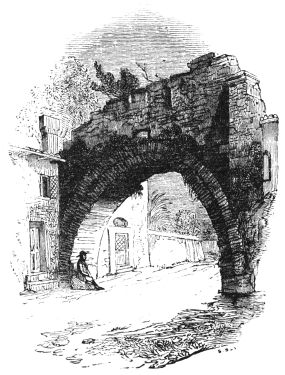
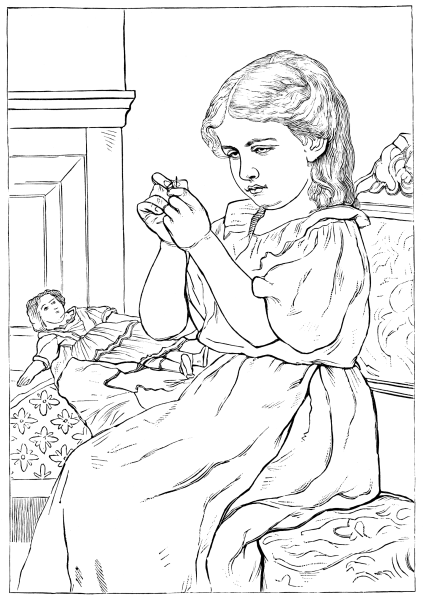 DRAWING-LESSON.
DRAWING-LESSON.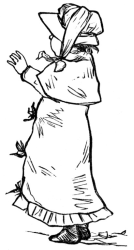
Put a good thick coat on the little girl. Button it well. Tie on her bonnet. Put a scarf over her ears. Now she is all ready. Now she will not mind the cold. Ah! whom does she see coming to meet her?
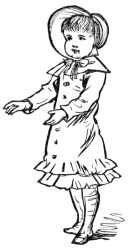
It is her cousin Sue. She is going to walk too. Is not that nice? "Come, little Ann," says Sue, "take hold of my hand and we will have a good time."—"So we will," says Ann. And off they go hand in hand.
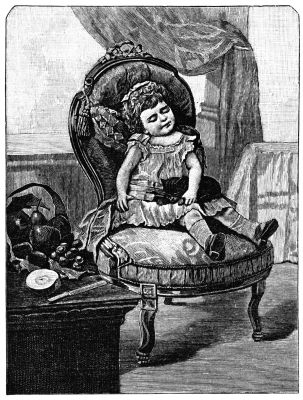
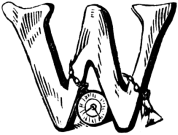
"When I saw her last," answered Helen, "she was having a great frolic with her kitten in the hall."
"Well," said Mrs. West, "I must have a hunt for Miss Lily. She may be getting into mischief." So she opened the door, and called, "Lily, Lily, where are you?"[372]
No answer came. Mrs. West looked into the nursery and bedrooms, but saw nothing of the little girl.
Then she went down stairs and looked into the parlor and hall. Lily was not there. She opened the front door and called "Lily, Lily!" but still in vain.
At last she went into the dining-room, and there, to be sure, was Lily fast asleep in a large chair, with Dinah the kitten in her lap, and a little black paw clasped in her chubby hand.
Mrs. West smiled and shut the door softly, saying to herself "Dear child, she is certainly doing no mischief." Then she called her sister to come down and peep in at the sleeping companions.
Helen said, "Isn't that a pretty picture? Suppose we take a big peach from this basket of fruit and put it softly beside her on the chair to surprise her when she wakes."
When Lily woke soon after, she rubbed her eyes, and said, "Why, where did this peach come from, I wonder! Have I been asleep, and has a fairy dropped it in my chair?"

"There are good people in the world, are there not, old fellow? And it certainly was one of them who put this trough here for poor beasts like you to drink from. Well, you are thirsty, to be sure! Don't you mean to[373] leave a drop there? What do you think the next donkey that comes along will do?
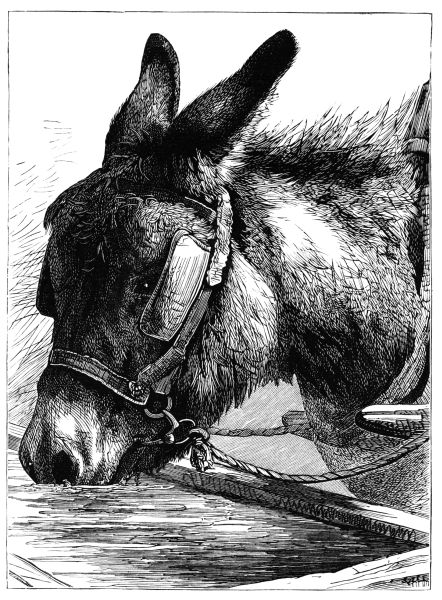
"Ah, you prick up your ears, and wink your eye, as much as to say, 'Never you fear about that, my friend. There's[374] no danger of my drinking all there is in this trough, and you know as well as I that there is plenty more water in the spring where this came from.'
"So at last, then, you have enough," added the farmer, as Billy lifted his dripping nose from the water.
"Come on then, long ears: we have another hill to climb, you know, and wife wants some of this meal to make a corn-cake for supper."
And Billy started on briskly, as if he knew well what supper meant, and thought he should have a share of corn-cake too.
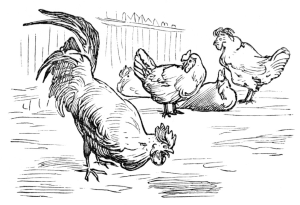
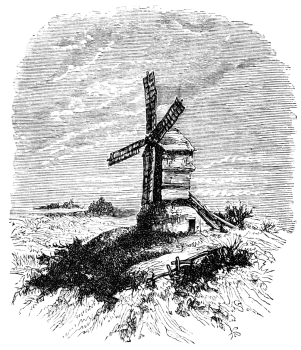

"That is a windmill," his father answered. "I don't wonder you call those long arms a whirligig, for they whirl round very swiftly when the wind blows.
"But they do not go round and round for nothing, as your toy whirligigs do. They are busy at work, turning a great wheel inside the mill; and the wheel is busy grinding corn into meal.
"There are not many windmills to be seen in our country; but if you should go to Holland, you would see them in all directions. Holland is a very flat country and has no swift rivers to turn the mill-wheels, so the wind has to do the work instead.[376]
"There are said to be ten thousand windmills there. The arms of some are a hundred feet long."
"I should like to see them," said Charlie. "Will you not take me there sometime, papa?"
"Perhaps," said his father, "but you are a small boy yet, and have much to see and learn at home first."

But just before reaching the house, they saw a forlorn-looking girl with her apron full of dry twigs which she had been picking by the roadside. She was thinly dressed, and looked pale and sad.
Annie's heart was touched at the sight. "Oh, mamma!" she said, "how tired and cold and hungry that poor girl looks! May I give her my apple?"
"Certainly, dear," said her mother, "you may give it to her. And ask her in to get warm."
So, quick as thought, Annie ran to the girl and held up the apple, saying, "Please take this. And mamma wants you to come into the house with us and get warm."
The girl could hardly keep back her tears at being so kindly spoken to. But she took the apple, thanked Annie, and followed her into the house. On questioning her, Mrs. Fay found that she was an orphan. She lived with a woman who was too poor to do much for her. She had to work hard, and the woman was not always kind to her.
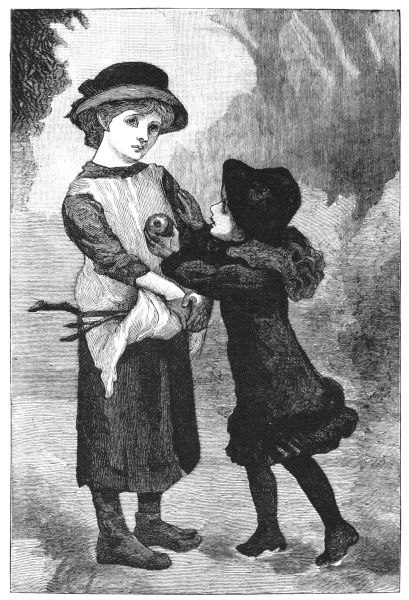
After getting warm and eating a good dinner, she cheered up wonderfully. And when Mrs. Fay put on her a woolen sacque and mittens and some thick shoes, she looked so happy and thankful that Annie was quite delighted.[378]
When Annie saw her grandmother, the next day, and told her what was done with the apple, the kind old lady said, "That was right. I am very glad you gave it to her. If she is a nice child I would like to have her live with me. I cannot move about much, and for some time I have wanted to find a handy little girl to wait on me."
And when Annie next went to her grandmother's house, there was the little girl, neatly dressed, and fast losing the sad look she had on her face when they met her that cold day.
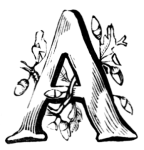
"Oh, yes, Toddy! I have seen more alligators than you can count fingers and thumbs on your little dimpled hands. But I saw the funniest one when I was in Kansas last winter; and if you will sit here on my lap, I will tell you all about it.
"One day, last year, when Flossie was in Jacksonville, Florida, with her parents, she saw a baby-alligator, and took such a fancy to it, that her papa bought it for her. They brought it home in the spring, and cousin Fred made a pen for it in the back-yard, near a large puddle of water; for alligators, you know, live in the water.
"Always after a rain, the water was quite deep, and 'Allie,' as Flossie named her pet, would splash about in it, as happy as could be. Flossie and all the children in the neighborhood, used to play with him every day.
"Before the spring was over, Allie was so tame, that he[379] would follow Flossie up to the house, where the children would feed him with fish or meat.
"The alligator kept growing and growing, until he was too large for the pen; and as he grew old, he grew so cross, that Flossie's papa sold him to a circus-man for a twenty-dollar gold-piece, and the children never saw their pet again."
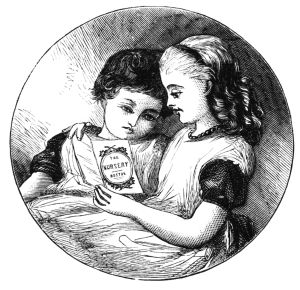
Obvious punctuation errors repaired.
The original text for the July issue had a table of contents that spanned six issues. This was divided amongst those issues.
Additionally, only the July issue had a title page. This page was copied for the remaining five issues. Each issue had the number added on the title page after the Volume number.
Table of Contents omits the mention of the Drawing-Lesson on page 369.
End of Project Gutenberg's The Nursery, December 1881, Vol. XXX, by Various
*** END OF THIS PROJECT GUTENBERG EBOOK THE NURSERY, DECEMBER 1881 ***
***** This file should be named 42161-h.htm or 42161-h.zip *****
This and all associated files of various formats will be found in:
http://www.gutenberg.org/4/2/1/6/42161/
Produced by Emmy, Juliet Sutherland and the Online
Distributed Proofreading Team at http://www.pgdp.net Music
transcribed by Veronika Redfern.
Updated editions will replace the previous one--the old editions
will be renamed.
Creating the works from public domain print editions means that no
one owns a United States copyright in these works, so the Foundation
(and you!) can copy and distribute it in the United States without
permission and without paying copyright royalties. Special rules,
set forth in the General Terms of Use part of this license, apply to
copying and distributing Project Gutenberg-tm electronic works to
protect the PROJECT GUTENBERG-tm concept and trademark. Project
Gutenberg is a registered trademark, and may not be used if you
charge for the eBooks, unless you receive specific permission. If you
do not charge anything for copies of this eBook, complying with the
rules is very easy. You may use this eBook for nearly any purpose
such as creation of derivative works, reports, performances and
research. They may be modified and printed and given away--you may do
practically ANYTHING with public domain eBooks. Redistribution is
subject to the trademark license, especially commercial
redistribution.
*** START: FULL LICENSE ***
THE FULL PROJECT GUTENBERG LICENSE
PLEASE READ THIS BEFORE YOU DISTRIBUTE OR USE THIS WORK
To protect the Project Gutenberg-tm mission of promoting the free
distribution of electronic works, by using or distributing this work
(or any other work associated in any way with the phrase "Project
Gutenberg"), you agree to comply with all the terms of the Full Project
Gutenberg-tm License available with this file or online at
www.gutenberg.org/license.
Section 1. General Terms of Use and Redistributing Project Gutenberg-tm
electronic works
1.A. By reading or using any part of this Project Gutenberg-tm
electronic work, you indicate that you have read, understand, agree to
and accept all the terms of this license and intellectual property
(trademark/copyright) agreement. If you do not agree to abide by all
the terms of this agreement, you must cease using and return or destroy
all copies of Project Gutenberg-tm electronic works in your possession.
If you paid a fee for obtaining a copy of or access to a Project
Gutenberg-tm electronic work and you do not agree to be bound by the
terms of this agreement, you may obtain a refund from the person or
entity to whom you paid the fee as set forth in paragraph 1.E.8.
1.B. "Project Gutenberg" is a registered trademark. It may only be
used on or associated in any way with an electronic work by people who
agree to be bound by the terms of this agreement. There are a few
things that you can do with most Project Gutenberg-tm electronic works
even without complying with the full terms of this agreement. See
paragraph 1.C below. There are a lot of things you can do with Project
Gutenberg-tm electronic works if you follow the terms of this agreement
and help preserve free future access to Project Gutenberg-tm electronic
works. See paragraph 1.E below.
1.C. The Project Gutenberg Literary Archive Foundation ("the Foundation"
or PGLAF), owns a compilation copyright in the collection of Project
Gutenberg-tm electronic works. Nearly all the individual works in the
collection are in the public domain in the United States. If an
individual work is in the public domain in the United States and you are
located in the United States, we do not claim a right to prevent you from
copying, distributing, performing, displaying or creating derivative
works based on the work as long as all references to Project Gutenberg
are removed. Of course, we hope that you will support the Project
Gutenberg-tm mission of promoting free access to electronic works by
freely sharing Project Gutenberg-tm works in compliance with the terms of
this agreement for keeping the Project Gutenberg-tm name associated with
the work. You can easily comply with the terms of this agreement by
keeping this work in the same format with its attached full Project
Gutenberg-tm License when you share it without charge with others.
1.D. The copyright laws of the place where you are located also govern
what you can do with this work. Copyright laws in most countries are in
a constant state of change. If you are outside the United States, check
the laws of your country in addition to the terms of this agreement
before downloading, copying, displaying, performing, distributing or
creating derivative works based on this work or any other Project
Gutenberg-tm work. The Foundation makes no representations concerning
the copyright status of any work in any country outside the United
States.
1.E. Unless you have removed all references to Project Gutenberg:
1.E.1. The following sentence, with active links to, or other immediate
access to, the full Project Gutenberg-tm License must appear prominently
whenever any copy of a Project Gutenberg-tm work (any work on which the
phrase "Project Gutenberg" appears, or with which the phrase "Project
Gutenberg" is associated) is accessed, displayed, performed, viewed,
copied or distributed:
This eBook is for the use of anyone anywhere at no cost and with
almost no restrictions whatsoever. You may copy it, give it away or
re-use it under the terms of the Project Gutenberg License included
with this eBook or online at www.gutenberg.org
1.E.2. If an individual Project Gutenberg-tm electronic work is derived
from the public domain (does not contain a notice indicating that it is
posted with permission of the copyright holder), the work can be copied
and distributed to anyone in the United States without paying any fees
or charges. If you are redistributing or providing access to a work
with the phrase "Project Gutenberg" associated with or appearing on the
work, you must comply either with the requirements of paragraphs 1.E.1
through 1.E.7 or obtain permission for the use of the work and the
Project Gutenberg-tm trademark as set forth in paragraphs 1.E.8 or
1.E.9.
1.E.3. If an individual Project Gutenberg-tm electronic work is posted
with the permission of the copyright holder, your use and distribution
must comply with both paragraphs 1.E.1 through 1.E.7 and any additional
terms imposed by the copyright holder. Additional terms will be linked
to the Project Gutenberg-tm License for all works posted with the
permission of the copyright holder found at the beginning of this work.
1.E.4. Do not unlink or detach or remove the full Project Gutenberg-tm
License terms from this work, or any files containing a part of this
work or any other work associated with Project Gutenberg-tm.
1.E.5. Do not copy, display, perform, distribute or redistribute this
electronic work, or any part of this electronic work, without
prominently displaying the sentence set forth in paragraph 1.E.1 with
active links or immediate access to the full terms of the Project
Gutenberg-tm License.
1.E.6. You may convert to and distribute this work in any binary,
compressed, marked up, nonproprietary or proprietary form, including any
word processing or hypertext form. However, if you provide access to or
distribute copies of a Project Gutenberg-tm work in a format other than
"Plain Vanilla ASCII" or other format used in the official version
posted on the official Project Gutenberg-tm web site (www.gutenberg.org),
you must, at no additional cost, fee or expense to the user, provide a
copy, a means of exporting a copy, or a means of obtaining a copy upon
request, of the work in its original "Plain Vanilla ASCII" or other
form. Any alternate format must include the full Project Gutenberg-tm
License as specified in paragraph 1.E.1.
1.E.7. Do not charge a fee for access to, viewing, displaying,
performing, copying or distributing any Project Gutenberg-tm works
unless you comply with paragraph 1.E.8 or 1.E.9.
1.E.8. You may charge a reasonable fee for copies of or providing
access to or distributing Project Gutenberg-tm electronic works provided
that
- You pay a royalty fee of 20% of the gross profits you derive from
the use of Project Gutenberg-tm works calculated using the method
you already use to calculate your applicable taxes. The fee is
owed to the owner of the Project Gutenberg-tm trademark, but he
has agreed to donate royalties under this paragraph to the
Project Gutenberg Literary Archive Foundation. Royalty payments
must be paid within 60 days following each date on which you
prepare (or are legally required to prepare) your periodic tax
returns. Royalty payments should be clearly marked as such and
sent to the Project Gutenberg Literary Archive Foundation at the
address specified in Section 4, "Information about donations to
the Project Gutenberg Literary Archive Foundation."
- You provide a full refund of any money paid by a user who notifies
you in writing (or by e-mail) within 30 days of receipt that s/he
does not agree to the terms of the full Project Gutenberg-tm
License. You must require such a user to return or
destroy all copies of the works possessed in a physical medium
and discontinue all use of and all access to other copies of
Project Gutenberg-tm works.
- You provide, in accordance with paragraph 1.F.3, a full refund of any
money paid for a work or a replacement copy, if a defect in the
electronic work is discovered and reported to you within 90 days
of receipt of the work.
- You comply with all other terms of this agreement for free
distribution of Project Gutenberg-tm works.
1.E.9. If you wish to charge a fee or distribute a Project Gutenberg-tm
electronic work or group of works on different terms than are set
forth in this agreement, you must obtain permission in writing from
both the Project Gutenberg Literary Archive Foundation and Michael
Hart, the owner of the Project Gutenberg-tm trademark. Contact the
Foundation as set forth in Section 3 below.
1.F.
1.F.1. Project Gutenberg volunteers and employees expend considerable
effort to identify, do copyright research on, transcribe and proofread
public domain works in creating the Project Gutenberg-tm
collection. Despite these efforts, Project Gutenberg-tm electronic
works, and the medium on which they may be stored, may contain
"Defects," such as, but not limited to, incomplete, inaccurate or
corrupt data, transcription errors, a copyright or other intellectual
property infringement, a defective or damaged disk or other medium, a
computer virus, or computer codes that damage or cannot be read by
your equipment.
1.F.2. LIMITED WARRANTY, DISCLAIMER OF DAMAGES - Except for the "Right
of Replacement or Refund" described in paragraph 1.F.3, the Project
Gutenberg Literary Archive Foundation, the owner of the Project
Gutenberg-tm trademark, and any other party distributing a Project
Gutenberg-tm electronic work under this agreement, disclaim all
liability to you for damages, costs and expenses, including legal
fees. YOU AGREE THAT YOU HAVE NO REMEDIES FOR NEGLIGENCE, STRICT
LIABILITY, BREACH OF WARRANTY OR BREACH OF CONTRACT EXCEPT THOSE
PROVIDED IN PARAGRAPH 1.F.3. YOU AGREE THAT THE FOUNDATION, THE
TRADEMARK OWNER, AND ANY DISTRIBUTOR UNDER THIS AGREEMENT WILL NOT BE
LIABLE TO YOU FOR ACTUAL, DIRECT, INDIRECT, CONSEQUENTIAL, PUNITIVE OR
INCIDENTAL DAMAGES EVEN IF YOU GIVE NOTICE OF THE POSSIBILITY OF SUCH
DAMAGE.
1.F.3. LIMITED RIGHT OF REPLACEMENT OR REFUND - If you discover a
defect in this electronic work within 90 days of receiving it, you can
receive a refund of the money (if any) you paid for it by sending a
written explanation to the person you received the work from. If you
received the work on a physical medium, you must return the medium with
your written explanation. The person or entity that provided you with
the defective work may elect to provide a replacement copy in lieu of a
refund. If you received the work electronically, the person or entity
providing it to you may choose to give you a second opportunity to
receive the work electronically in lieu of a refund. If the second copy
is also defective, you may demand a refund in writing without further
opportunities to fix the problem.
1.F.4. Except for the limited right of replacement or refund set forth
in paragraph 1.F.3, this work is provided to you 'AS-IS', WITH NO OTHER
WARRANTIES OF ANY KIND, EXPRESS OR IMPLIED, INCLUDING BUT NOT LIMITED TO
WARRANTIES OF MERCHANTABILITY OR FITNESS FOR ANY PURPOSE.
1.F.5. Some states do not allow disclaimers of certain implied
warranties or the exclusion or limitation of certain types of damages.
If any disclaimer or limitation set forth in this agreement violates the
law of the state applicable to this agreement, the agreement shall be
interpreted to make the maximum disclaimer or limitation permitted by
the applicable state law. The invalidity or unenforceability of any
provision of this agreement shall not void the remaining provisions.
1.F.6. INDEMNITY - You agree to indemnify and hold the Foundation, the
trademark owner, any agent or employee of the Foundation, anyone
providing copies of Project Gutenberg-tm electronic works in accordance
with this agreement, and any volunteers associated with the production,
promotion and distribution of Project Gutenberg-tm electronic works,
harmless from all liability, costs and expenses, including legal fees,
that arise directly or indirectly from any of the following which you do
or cause to occur: (a) distribution of this or any Project Gutenberg-tm
work, (b) alteration, modification, or additions or deletions to any
Project Gutenberg-tm work, and (c) any Defect you cause.
Section 2. Information about the Mission of Project Gutenberg-tm
Project Gutenberg-tm is synonymous with the free distribution of
electronic works in formats readable by the widest variety of computers
including obsolete, old, middle-aged and new computers. It exists
because of the efforts of hundreds of volunteers and donations from
people in all walks of life.
Volunteers and financial support to provide volunteers with the
assistance they need are critical to reaching Project Gutenberg-tm's
goals and ensuring that the Project Gutenberg-tm collection will
remain freely available for generations to come. In 2001, the Project
Gutenberg Literary Archive Foundation was created to provide a secure
and permanent future for Project Gutenberg-tm and future generations.
To learn more about the Project Gutenberg Literary Archive Foundation
and how your efforts and donations can help, see Sections 3 and 4
and the Foundation information page at www.gutenberg.org
Section 3. Information about the Project Gutenberg Literary Archive
Foundation
The Project Gutenberg Literary Archive Foundation is a non profit
501(c)(3) educational corporation organized under the laws of the
state of Mississippi and granted tax exempt status by the Internal
Revenue Service. The Foundation's EIN or federal tax identification
number is 64-6221541. Contributions to the Project Gutenberg
Literary Archive Foundation are tax deductible to the full extent
permitted by U.S. federal laws and your state's laws.
The Foundation's principal office is located at 4557 Melan Dr. S.
Fairbanks, AK, 99712., but its volunteers and employees are scattered
throughout numerous locations. Its business office is located at 809
North 1500 West, Salt Lake City, UT 84116, (801) 596-1887. Email
contact links and up to date contact information can be found at the
Foundation's web site and official page at www.gutenberg.org/contact
For additional contact information:
Dr. Gregory B. Newby
Chief Executive and Director
[email protected]
Section 4. Information about Donations to the Project Gutenberg
Literary Archive Foundation
Project Gutenberg-tm depends upon and cannot survive without wide
spread public support and donations to carry out its mission of
increasing the number of public domain and licensed works that can be
freely distributed in machine readable form accessible by the widest
array of equipment including outdated equipment. Many small donations
($1 to $5,000) are particularly important to maintaining tax exempt
status with the IRS.
The Foundation is committed to complying with the laws regulating
charities and charitable donations in all 50 states of the United
States. Compliance requirements are not uniform and it takes a
considerable effort, much paperwork and many fees to meet and keep up
with these requirements. We do not solicit donations in locations
where we have not received written confirmation of compliance. To
SEND DONATIONS or determine the status of compliance for any
particular state visit www.gutenberg.org/donate
While we cannot and do not solicit contributions from states where we
have not met the solicitation requirements, we know of no prohibition
against accepting unsolicited donations from donors in such states who
approach us with offers to donate.
International donations are gratefully accepted, but we cannot make
any statements concerning tax treatment of donations received from
outside the United States. U.S. laws alone swamp our small staff.
Please check the Project Gutenberg Web pages for current donation
methods and addresses. Donations are accepted in a number of other
ways including checks, online payments and credit card donations.
To donate, please visit: www.gutenberg.org/donate
Section 5. General Information About Project Gutenberg-tm electronic
works.
Professor Michael S. Hart was the originator of the Project Gutenberg-tm
concept of a library of electronic works that could be freely shared
with anyone. For forty years, he produced and distributed Project
Gutenberg-tm eBooks with only a loose network of volunteer support.
Project Gutenberg-tm eBooks are often created from several printed
editions, all of which are confirmed as Public Domain in the U.S.
unless a copyright notice is included. Thus, we do not necessarily
keep eBooks in compliance with any particular paper edition.
Most people start at our Web site which has the main PG search facility:
www.gutenberg.org
This Web site includes information about Project Gutenberg-tm,
including how to make donations to the Project Gutenberg Literary
Archive Foundation, how to help produce our new eBooks, and how to
subscribe to our email newsletter to hear about new eBooks.